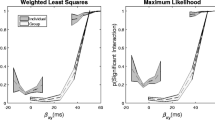Abstract
Overcontrol, a personal propensity to control or dominate others, is examined as found in large retirement communities. Aspects of personality theory related to control issues are examined and utilized, particularly social cognitive and cognitive-affective personality system theories. Aspects of social psychological theory, particularly interactional role theory and reference group theory, are also employed. Overcontrol, which is asserted to flourish particularly in large retirement communities, is viewed as a coping device designed to ensure protection against anxiety, and as an intensification of a healthy control trait in the elderly. Three patterns are presented and some approaches to their mitigation are discussed.
Similar content being viewed by others
REFERENCES
Aleksiuk, M. (1996). Power therapy: Maximizing health through self-efficacy. Seattle: H & H Publishers.
Baldwin, M. W. (1999). Relational schemas: Research into social-cognitive aspects of interpersonal experience. In D. Cervone & Y. Shoda (Eds.), The coherence of personality: Social-cognitive bases of consistency, variability and organization (pp. 127–154). New York: The Guilford Press.
Bandura, A. (1997). Self-efficacy: The exercise of control. New York: W. H. Freeman and Company.
Bultena, G. (1974). Structural effects on the morale of the aged: A comparison of age-segregated and age-integrated communities. In J. F. Gubrium (Ed.), Late life communities and environmental policy (pp. 18–31). Springfield, Illinois: Charles C. Thomas.
Bultena, G. & Powers, E. (1976). Effects of age-grade comparisons on adjustment in later life. In J. F. Gubrium (Ed.), Time, roles, and self in old age (pp. 165–178). New York: Human Sciences Press.
Cervone, D. (1999). Bottom-up explanation in personality psychology: The case of cross-situational coherence. In D. Cervone & Y. Shoda (Eds.), The coherence of personality: Social-cognitive bases of consistency, variability, and organization (pp. 303–345). New York: The Guilford Press.
Davenport, G. (1999). Working with toxic older adults. New York: Springer.
Havinghurst, R. J., & Neugarten, B. L. (1969). Disengagement reconsidered in a crossnational context. In R. J. Havighurst, J. M. A. Munnichs, B. Neugarten, & H. Thomae (Eds.), Adjustment to retirement: A crossnational study (pp. 138–146). Assen: Van Gorcum Comp. N. V. Dr. H. J. Prakke & H. M. G. Prakke.
Jacobs, J. (1974). Fun city: An ethnographic study of a retirement community. New York: Holt, Rinehart and Winston, Inc.
Jacobs, J. (1975). Older persons and retirement communities: Case studies in social gerontology. Springfield, Illinois: Charles C. Thomas.
Langer, E., & Rodin, J. (1976). The efforts of choice and enhanced personal responsibilities for the aged: A field experiment in an institutional setting. Journal of Personality and Social Psychology, 34, 191–198.
McCrae, R. R., & Costa, P. T., Jr. (1996). Toward a new generation of personality theories: Theoretical contexts for the five-factor model. In J. S. Wiggins (Ed.), The five-factor model of personality: Theorical perspectives (pp. 51–87). New York: The Guilford Press.
Mischel, W. (1999). Personality coherence and dispositions in a cognitive-affective personality system (CAPS) approach. In D. Cervone & Y. Shoda (Eds.), The coherence of personality: Social-cognitive bases of consistency, variability, and organization (pp. 37–60). New York: The Guilford Press.
Mischel, W., & Shoda,Y. (1995). A cognitive-affective system theory of personality: Reconceptualizing situations, dispositions, dynamics, and invariance in personality structure. Psychological Review, 102, 246–286.
Osgood, N. J. (1982). Senior settlers: Social integration in retirement communities. New York: Praeger.
Reichard, S. (1962). The armored. The angry men. In S. Reichard, F. Livson, & P. G. Peterson (Eds.), Aging and personality: A study of 87 older men (pp. 136–154). New York: John Wiley and Sons.
Rodin, J. (1986a). Aging and health: Effects of the sense of control. Science, 233, 1271–1276.
Rodin, J. (1986b). Health, control, and aging. In M. M. Baltes & P. B. Baltes (Eds.), The psychology of control and aging (pp. 139–165). Hillsdale, New Jersey: Lawrence Erlbaum Associates.
Rodin, J., & Langer, E. (1977). Long-term effect of control-relevant intervention. Journal of Personality and Social Psychology, 35, 897–902.
Saussy, C. (1986). Control: Power or impotence? Quarterly Review, 6, 2, 48–58.
Schultz, R. (1976). Effects of control and predictability on physical and psychological well-being of the institutionalized aged. Journal of Personality and Social Psychology, 33, 563–573.
The Arizona Republic, August 13, 2000, p. A22.
Author information
Authors and Affiliations
Rights and permissions
About this article
Cite this article
Lapsley, J.N. Overcontrol in Retirement Communities. Pastoral Psychology 49, 439–450 (2001). https://doi.org/10.1023/A:1010301617923
Issue Date:
DOI: https://doi.org/10.1023/A:1010301617923




